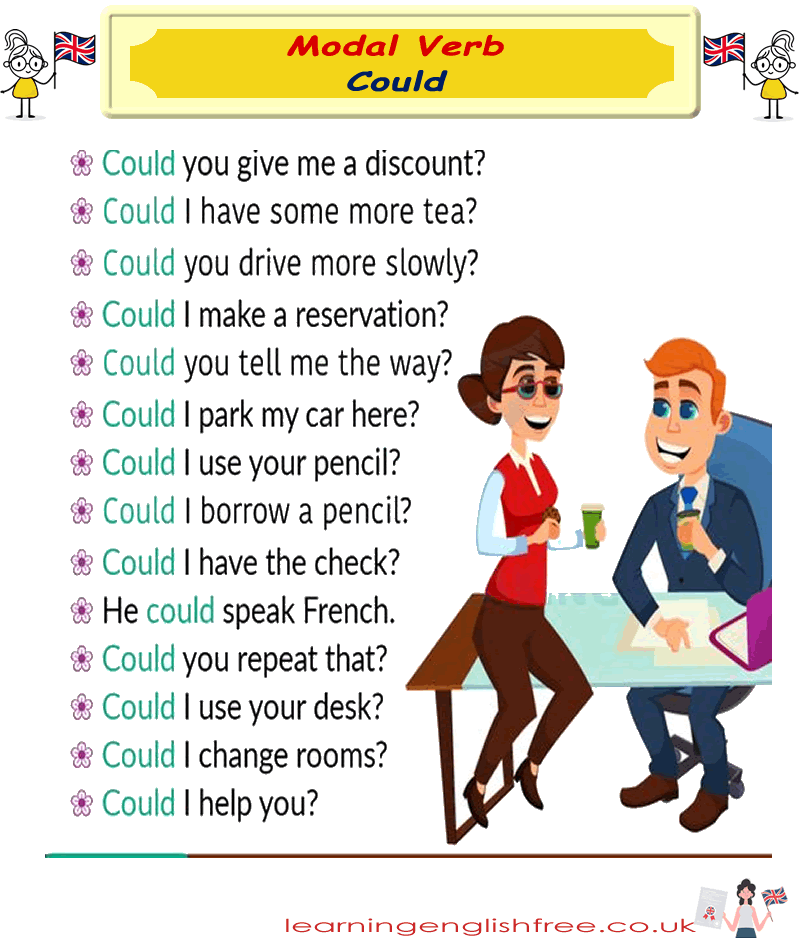
The Modal Verb "Could" in English Communication
The modal verb "could" is a versatile and essential component of the English language, offering a way to express possibility, make polite requests, ask for permission, and discuss abilities in the past. As an ESL learner, understanding how to correctly use "could" can significantly enhance your conversational and writing skills, making your English sound more natural and polite. This lesson will delve into the various uses of "could," providing you with the tools to effectively incorporate this modal verb into your daily English use.
Useful Vocabulary for the Modal Verb "Could"
Before we explore the different ways to use "could," let's familiarize ourselves with some key vocabulary that will help us better understand this lesson:
- Modal Verb: A type of auxiliary verb that is used to indicate modality – likelihood, ability, permission, and obligation.
- Request: An act of politely or formally asking for something.
- Permission: Authorization or consent to do something.
- Ability: Possession of the means or skill to do something.
- Polite: Showing good manners or respect towards others.
With these terms in mind, let's examine how "could" is used in various contexts, with meanings and examples for each.
Understanding "Could" through Examples
-
Making Polite Requests
- Meaning: "Could" is often used to make polite requests.
- Example: "Could you give me a discount?"
-
Asking for Permission
- Meaning: Used to ask for permission in a polite manner.
- Example: "Could I park my car here?"
-
Expressing Past Ability
- Meaning: Indicates an ability someone had in the past.
- Example: "He could speak French when he was a child."
-
Offering to Help Someone
- Meaning: "Could" can be used to offer help politely.
- Example: "Could I help you with that?"
-
Asking Someone to Repeat Something
- Meaning: Used to politely ask someone to repeat what they said.
- Example: "Could you repeat that, please?"
-
Making Suggestions
- Meaning: "Could" is used to suggest possible actions.
- Example: "We could see a movie tonight if you're interested."
-
Expressing Future Possibility
- Meaning: Indicates a possibility in the future.
- Example: "It could rain tomorrow."
-
Asking for Something
- Meaning: Used to politely ask for something.
- Example: "Could I have some more tea, please?"
-
Expressing Conditional Ability
- Meaning: Indicates an ability in a specific condition or situation.
- Example: "I could finish this by tomorrow if I start now."
-
Polite Refusal
- Meaning: "Could" can be used to refuse politely.
- Example: "I'm sorry, but I couldn't possibly accept this gift."
-
Inquiring About Preferences
- Meaning: Used to inquire about someone's preferences in a polite way.
- Example: "Where could we meet for lunch?"
-
Expressing Irritation (in questions)
- Meaning: Can indicate irritation when asking about the possibility of an action stopping.
- Example: "Could you please stop making that noise?"
Summary and Takeaways
The modal verb "could" is a key element of polite and effective communication in English, enabling ESL learners to navigate social interactions more smoothly. Whether you're making requests, asking for permission, expressing abilities, or offering help, "could" enhances the politeness and flexibility of your language.
To practice, try creating your own sentences using "could" in different contexts or engage in role-playing exercises where you ask for permission, make requests, and offer help. Remember, the more you practice, the more naturally "could" will fit into your everyday English conversations.
Sharing your learning journey and experiences with "could" on platforms like www.facebook.com/learningenglishfree.co.uk can also be a great way to get feedback and tips from fellow learners and educators. Don't hesitate to reach out and connect with our community for more lessons and support in mastering the English language.
